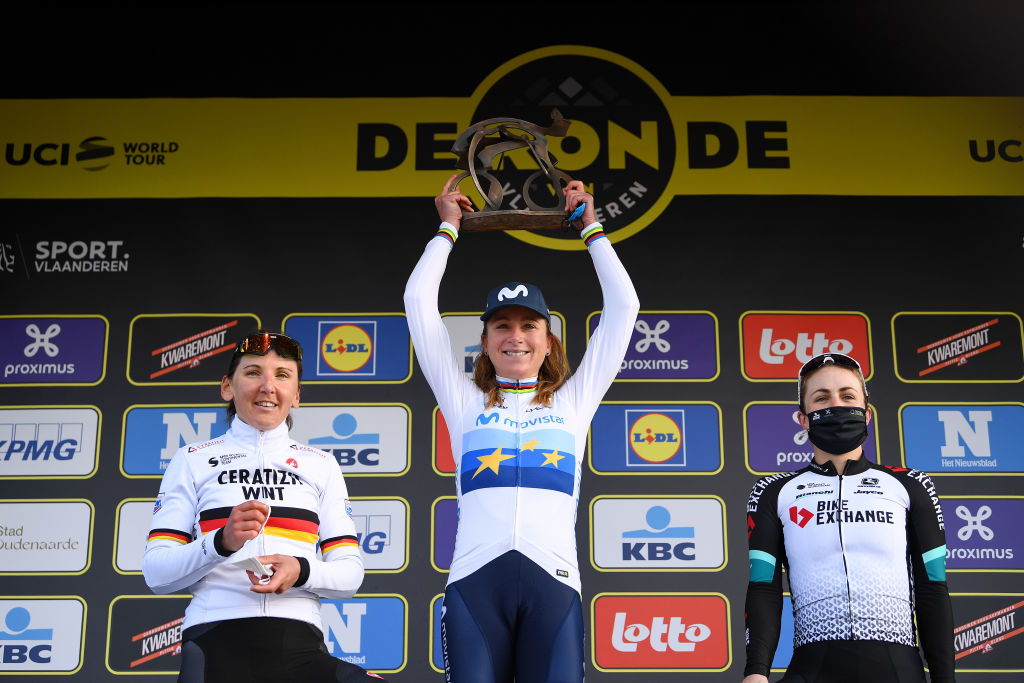Improving women’s race broadcasting more important than equal prize money argues Flanders Classics CEO
'We are on the right track but there is still a lot to do' says Tomas Van Den Spiegel

The decision to create equal prize funds in the men’s and women’s Danilith Nokere Koerse races in 2022 has sparked debate about how to best improve women’s racing, with Flanders Classics CEO Tomas Van Den Spiegel suggesting the move is more of a symbolic act as the Belgian one-day race looks to secure a place in the women’s WorldTour in 2023.
Van Den Spiegel believes that equaling prize money should only be the third strategic option after improving broadcasting coverage and so sponsor exposure, and then awarding more start money for all teams to help them cover their operational costs.
Flanders Classics organise most of the major one-day races in Belgium – including Omloop Het Nieuwsblad, Gent-Wevelgem, and the Tour of Flanders – often squeezing out smaller rivals. They have added women’s races alongside their leading men’s events and drawn up a multi-year strategic business plan for women's cycling called ‘Close The Gap’ with advisors KPMG Belgium.
“I don’t underestimate the symbolism of the prize money but at the same time so much more budget is needed to make women's cycling better via other means,” Van Den Spiegel told the Belgian media.
“Television as an absolute priority. The more TV coverage, the more money you get in the sport. This is via TV rights but also through sponsorship, which is the most crucial source of income for teams. And if more money is generated, we would rather see it divided among the teams. This way you reward the entire peloton, not just a limited number of riders, often the same ones, who constantly excel.”
As a race organiser, Flanders Classics would also benefit if television rights and sponsorship revenue increased, while higher prize money is simply an extra cost.
While women have welcomed an increase in prize money at a number of races and championships in recent years, Van Den Spiegel suggests that the riders understand it is not the best option to grow women’s cycling.
The latest race content, interviews, features, reviews and expert buying guides, direct to your inbox!
“They’re not asking for that,” he argued. “There was crowdfunding last season to equate the prize money at Strade Bianche.
“Well, the riders did not accept that, they chose to donate all the money raised to projects that are committed to women's cycling."
Van Den Spiegel revealed that Flanders Classics will present its own initiatives to improve women’s racing in 2022 in February. Flanders Classics is working towards prize money parity in 2023.
He remains optimistic about the development and growth of women’s racing.
“It's an additional investment to give women's cycling an extra boost,” he said.
“The women’s Tour de France will return next year, and there was the first Paris-Roubaix on TV, which is all very positive. We are on the right track, but there is still a lot to do.”
Cyclingnews is the world's leader in English-language coverage of professional cycling. Started in 1995 by University of Newcastle professor Bill Mitchell, the site was one of the first to provide breaking news and results over the internet in English. The site was purchased by Knapp Communications in 1999, and owner Gerard Knapp built it into the definitive voice of pro cycling. Since then, major publishing house Future PLC has owned the site and expanded it to include top features, news, results, photos and tech reporting. The site continues to be the most comprehensive and authoritative English voice in professional cycling.